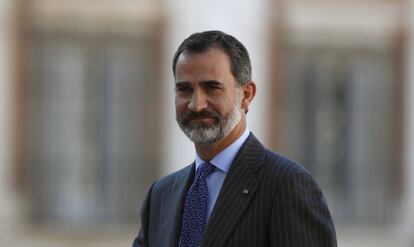Spain’s parties split over royal visit to Saudi Arabia
Key warship-building contract at stake, but opposition wants King Felipe to talk human rights

Spain’s main political parties are divided over King Felipe’s upcoming visit to Saudi Arabia. The ruling Popular Party (PP) and the main opposition Socialist Party (PSOE) back the trip, hoping it will facilitate the signing of a €2-billion order for five warships to be built by Spain’s state-owned Navantia. Emerging center-right grouping Ciudadanos also supports the visit, but has called on King Felipe to raise human rights abuses in the kingdom during his four-day visit that begins on November 12. The left-leaning anti-austerity Podemos has criticized the trip, along with Catalonia’s two main parties.
“We are particularly interested in human rights and the law being respected everywhere in the world,” said Rafael Hernando, the government’s spokesman in Congress. He added: “There are Spanish interests in Saudi Arabia that will affect the jobs of thousands of Spaniards in the shipping industry and infrastructure. A visit to this or that country doesn’t mean one approves of its political system, otherwise our foreign policy would be very limited. I am sure that human rights issues will be raised.”
We should be ashamed
Irene Montero, Podemos
Spain has long-standing trade ties to Saudi Arabia, thanks in part to the good relationship between former monarch Juan Carlos with the Saudi royal family.
Spain’s arms trade with Saudi Arabia hit a record €447.6 million during the first quarter of last year, representing 26% of all Spanish arms exports during the same period.
In 2011, Spain won a €6.7-billion contract to build a high-speed rail line between Medina and Mecca. It was scheduled to be inaugurated on January 1, 2017, but faces delays. What was originally meant to be a showcase for Spain’s mastery of high-speed rail infrastructure has been hit by political intrigue, delays, and technical problems.
As a result of the 10-month political stalemate following two inconclusive elections, King Felipe had to postpone the trip which was expected to take place in February. Other visits to Morocco, Japan and South Korea have been delayed, while dignitaries from Argentina and Israel have placed their visits to Spain on hold.
There are Spanish interests in Saudi Arabia that will affect the jobs of thousands of Spaniards Rafael Hernando, PP
José María González, the Podemos mayor of the southern port city of Cadiz, has said that the southern port city, which has one of the highest unemployment rates in the country, would benefit from the Saudi ship-building contract.
But Irene Montero and Íñigo Errejón of Podemos have criticized King Felipe’s visit.
“We should be ashamed,” said Montero. “González was not elected to decide Spain’s foreign policy,” said Errejón, adding: “We want our shipyards to have work, but we would like to see more awareness about countries that are documented systematic human rights abusers.”
“It is one thing to carry out diplomacy and another to defend one’s position,” said Albert Rivera, mentioning US President Barrack Obama’s trip to Cuba earlier this year.
“This is an important contract and we need to secure it, but that doesn’t mean that the King cannot make a gesture, a reminder, and speak about the need to defend human rights,” said Juan Carlos Girauta, Ciudadanos’ spokesman. “Other heads of state have done so. It can be uncomfortable, but is important,” he added.
The Catalan Republican Left (ERC) and the conservative Catalan Democratic Convergence (CDC) both criticized the trip, describing it as “extremely questionable in democratic terms.”
English version by Nick Lyne.
Tu suscripción se está usando en otro dispositivo
¿Quieres añadir otro usuario a tu suscripción?
Si continúas leyendo en este dispositivo, no se podrá leer en el otro.
FlechaTu suscripción se está usando en otro dispositivo y solo puedes acceder a EL PAÍS desde un dispositivo a la vez.
Si quieres compartir tu cuenta, cambia tu suscripción a la modalidad Premium, así podrás añadir otro usuario. Cada uno accederá con su propia cuenta de email, lo que os permitirá personalizar vuestra experiencia en EL PAÍS.
¿Tienes una suscripción de empresa? Accede aquí para contratar más cuentas.
En el caso de no saber quién está usando tu cuenta, te recomendamos cambiar tu contraseña aquí.
Si decides continuar compartiendo tu cuenta, este mensaje se mostrará en tu dispositivo y en el de la otra persona que está usando tu cuenta de forma indefinida, afectando a tu experiencia de lectura. Puedes consultar aquí los términos y condiciones de la suscripción digital.








































